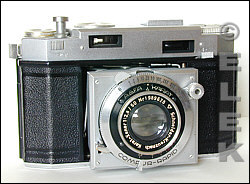Agfa Karat 12

|
|
|
| Style, film format | Folding 35mm with coupled rangefinder |
|
|
|
| Lens, shutter | Uncoated 50mm f/2.8 Schneider-Kreuznach Xenar, Compur-Rapid |
|
|
|
| Photo quality | Very good |
|
|
|
| Ergonomics | Split-image rangefinder is only average |
|
|
|
This small folding 35mm camera emerged in the 1940s, I believe, and used preloaded cartridges carrying a short length of film that allowed you to shoot 12 photos at one time.
This particular camera is fitted with an uncoated Schneider-Kreuzenach Xenar lens set in a Compur-Rapid shutter. It uses a split-image rangefinder -- literally an image that is split horizontally. You align the top and bottom halves of your image.
The lens collapses flat with the body for easy storage. To extend the lens, push the small button on the right front face of camera, and the lens and shutter assembly pop out.
The film advance is a small lever that you push toward the center of the camera.
The film feeds from one cassette on the left into an identical cassette on the right. The camera is designed so that the film leader is left sticking out slightly for easy retrieval. That's a good thing, because I don't see any easy way to retrieve the leader if it goes into the film cassette.
The modern-day method of loading film is to spool a 12-exposure roll and then in a changing bag, transfer it to the Agfa cassette. And because you only get 12 exposures, it's not a camera that begs to be used often. I think you might be able to use a modern 35mm cassette that has the spool removed and the ends capped, but I've yet to give that a try.
The uncoated lens is prone to flaring easily, but photos were quite sharp and with very good contrast.
